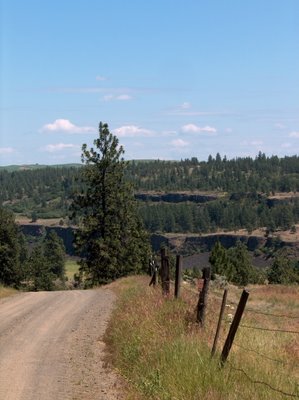Monday, June 26, 2006
I'm giving you a little taste of an article in the December 2005 Atlantic Monthly called "Is God An Accident?". It makes a lot of sense and explains why so many people must believe in gods. Some of the findings eked out in the studies described below came from observations of autistic children. It's interesting to me how much of our knowledge of how the brain functions is based on studies of those with major or minor brain malfunctions. The information contained in this article will perhaps make it unnecessary for me to read Why God Won’t Go Away, a book I've had on my shelf a long while. But, then, I've got lots of books I'm only slowly getting to which I've purchased while working at the Spokane library book store down in the lobby. At a dollar or a couple of dollars a book, who can resist?
The picture is of a road leading into an interesting geological feature here in the Inland Empire, called Hole In the Ground. Though not very large nor impressive in size, it's story is interesting. It was carved out thousands of years ago when a great inland sea in what is now Montana broke through its ice dam and ran wild to the west, carving out many such features in the terrain.
[OPEN QUOTE] At this point the religion-as-accident theory says nothing about supernatural beliefs. Babies have two systems that work in a cold-bloodedly rational way to help them anticipate and understand—and when the get older, to manipulate—physical and social entities. In other words, both these systems are biological adaptations that give human beings a badly needed head start in dealing with objects and people. But these systems go awry in two important ways that are the foundations of religion. First, we perceive the world of objects as essentially separate from the world of minds, making it possible for us to envision soulless bodies and bodiless souls. This helps explain why we believe in gods and an afterlife. Second, as we will see, our system of social understanding overshoots, inferring goals and desires where none exist. This makes us animists and creationists.
For those of us who are not autistic, the separateness of these two mechanisms, one for understanding the physical world and one for understanding the social world, gives rise to a duality of experience. We experience the world of material things as separate from the world of goals and desires. The biggest consequence has to do with the way we think of ourselves and others. We are dualists, it seems intuitively obvious that a physical body and a conscious entity—a mind or soul—are genuinely distinct. We don't feel that we are our bodies. Rather, we feel that we occupy them, we possess them, we own them.
This duality is immediately apparent in our imaginative life. Because we see people as separate from their bodies, we easily understand situations in which people's bodies are radically changed while their personhood stays intact. Kafka envisioned a man transformed into a gigantic insect; Homer described the plight of men transformed into pigs; in Shrek2 an ogre is transformed into a human being, and a donkey into a steed; in Star Trek a scheming villain forcibly occupies Captain Kirk's body so as to take command of the Enterprise; in The Tale of the Body Thief Anne Rice tells of a vampire and a human being who agree to trade bodies for a day; and in 13 Going on 30 a teenager wakes up as thirty-year-old Jennifer Garner. We don't think of these events as real, of course, but they are fully understandable, it makes intuitive sense to us that people can be separated from their bodies, and similar transformations show up in religions around the world.
This notion of an immaterial soul potentially separable from the body clashes starkly with the scientific view. For psychologists and neuroscientists, the brain is the source of mental life; our consciousness, emotions, and will are the products of neural processes. As the claim is sometimes put: The mind is what the brain does. I don't want to overstate the consensus here; there is no accepted theory as to precisely how this happens, and some scholars are skeptical that we will ever develop such a theory. But no scientist takes seriously Cartesian dualism, which posits that thinking need not involve the brain. There is just too much evidence against it. [CLOSE QUOTE]
Subscribe to:
Post Comments (Atom)

No comments:
Post a Comment